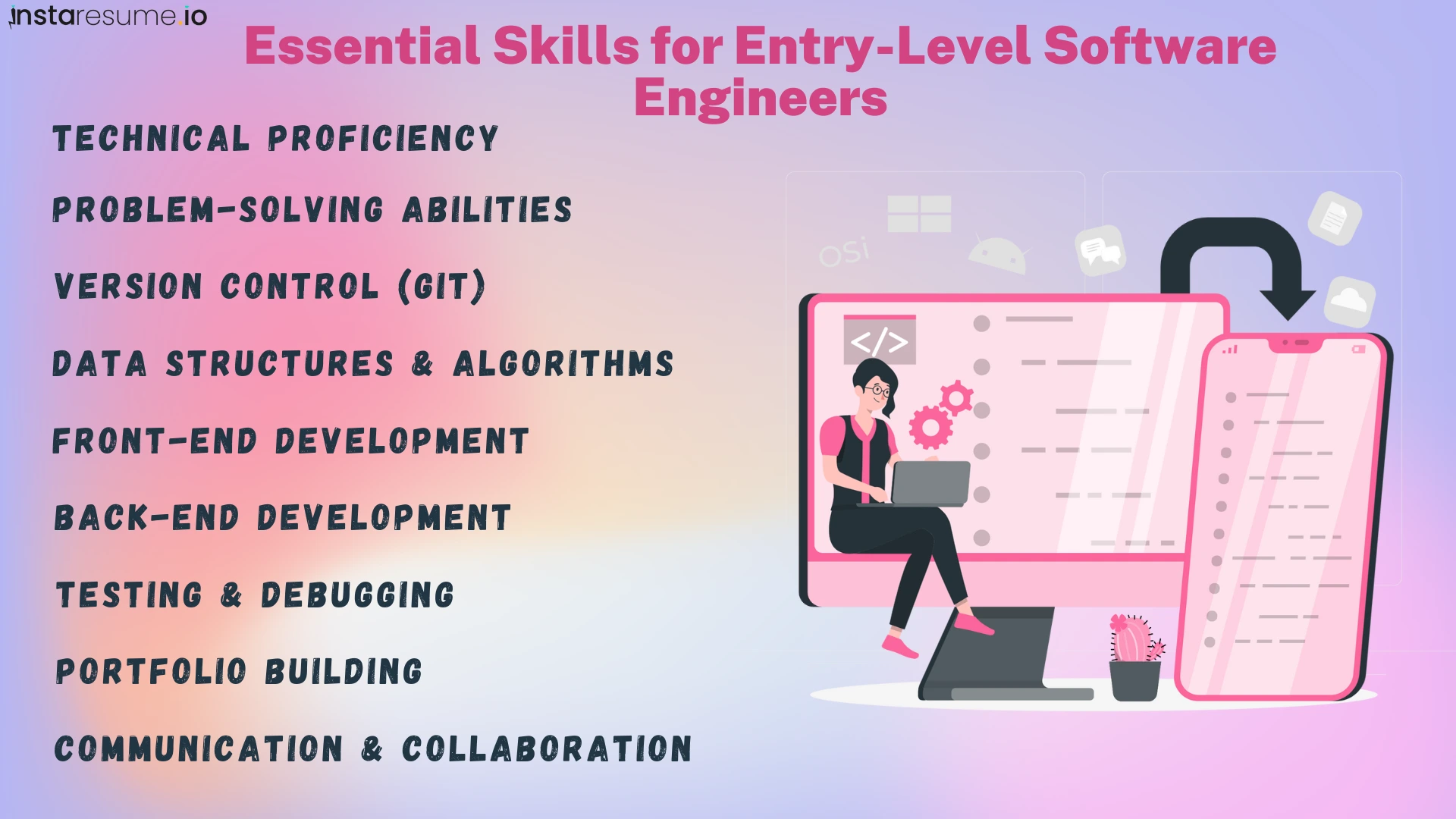What are key skills for entry level software engineer?

Master these skills to kickstart your Career
In the world of software engineering, mastering essential skills is the key to success. Join us as we explore the crucial competencies and the skills required for software engineer. Discover the skills that open doors to rewarding opportunities in a competitive job market. Whether you're a recent graduate or making a career change, this blog offers practical insights to kickstart your software development career.
What are key skills for entry level software engineer?
Entering the field of software engineering can be both exciting and challenging. Here are the skills required for software engineer

Entry Level skills for software engineers
Technical Proficiency
Strong coding skills are fundamental. Proficiency in languages like Python, Java, or JavaScript is essential to deliver your projects within tight deadline. You can't cram syntax of all the major languages, but having at-least conceptual knowledge of various languages always helps to standout from the crowd.
Version Control (Git)
Git is crucial for code collaboration. Understand version control and platforms like GitHub. This will help you to collaborate with your team with ease. Knowing the mostly used commands and referring to Git commands cheatsheets will save alot of time.
Data Structures Algorithms
Understanding data structures and algorithms enhances efficiency and problem-solving. Practice solving coding challenges on platforms like LeetCode, HackerRank, CodeForces or CodeSignal.
Front-End Development
Front-end skills involve creating user interfaces. HTML, CSS, and JavaScript are foundational.Example: A front-end developer designs a responsive and user-friendly e-commerce website using HTML, CSS, and JavaScript. The website provides an intuitive shopping experience for customers.
Back-End Development
Back-end skills handle server-side logic. Learn languages like Node.js, Ruby, or PHP. Best way to learn back-end development is from practice. Try on to contribute to maximum open-source projects.
Testing & Debugging
Testing skills ensure software quality. Debugging resolves issues effectively. As a starting point, you should always stay curious about new softwares and keep on using most of the features of each app. Try on to explore more and more within the product niche that you like the most.
Communication & Collaboration
Soft skills are essential. Effective communication and teamwork boost productivity.
Example: During a team meeting, a software engineer effectively communicates their progress on a project, discusses challenges, and collaborates with colleagues to find solutions. Clear communication helps the team stay aligned.
Portfolio Building
Showcase projects in a portfolio. It demonstrates practical skills to potential employers.
Example: A software engineer creates a personal website as a portfolio, detailing their projects, including a weather forecasting app, an e-commerce website, and a blog platform they developed. The portfolio demonstrates their diverse technical skills and project experience.
How to land as an entry-level software engineer?
Each person's journey may be unique, so adapt your approach as needed to achieve your career goals.
1. Build a Strong Foundation
Start with a solid educational background, preferably a bachelor's degree in computer science, software engineering, or a related field.
2. Gain Practical Experience
Work on personal coding projects to apply your knowledge and showcase your skills. Consider contributing to open-source projects .Pursue internships or co-op programs to gain real-world experience.
3. Networking
Build a professional online profile on LinkedIn and connect with industry professionals, including recruiters and your seniors. Attend tech meetups, conferences, and networking events to make connections.
4. Tailor Your Resume and Cover Letter
Create a tailored resume and cover letter for each job application, emphasizing relevant skills and experiences. Use action verbs and quantify achievements where possible.
5. Apply Strategically
Target entry-level positions that align with your skills and interests. Apply directly through company websites and job boards like LinkedIn, Indeed, and Glassdoor.
6. Prepare for Interviews
Practice coding interviews, whiteboard sessions, and behavioral questions. Research the company and be prepared to explain how your skills match their needs.
7. Soft Skills and Communication
Showcase your ability to work in a team, communicate effectively, and adapt to different situations. Use the STAR (Situation, Task, Action, Result) method to structure your behavioral interview responses.
8. Be Persistent and Stay Positive
Job searching can be challenging, and rejection is common. Keep applying, learning, and improving.
By following these specific steps, you can increase your chances of landing an entry-level software engineering job in a competitive job market.
Conclusion
As an aspiring software engineer, mastering essential skills such as coding, problem-solving, version control, data structures, front-end and back-end development, database management, testing, and soft skills is key. Building a strong portfolio enhances your prospects. Stay updated and embrace the learning journey for a successful career in software engineering.

